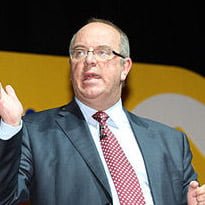NHS on a ‘burning financial platform’
- 21 June 2012

NHS chief executive Sir David Nicholson has warned NHS managers that the health service is on a "burning financial platform" and must address the need for structural change.
Speaking at the NHS Confederation’s annual conference in Manchester today, Sir David said the NHS was tackling the challenge he set it before the general election to save £20 billion over four years to bridge the gap between flat funding and rising demand and costs.
He said the NHS had managed to find £4.3 billion savings in the year before the Department of Health introduced the quality, innovation, productivity and prevention programme to try and avoid the ‘salami slicing’ cuts, rising waiting lists and deteriorating facilities that characterised previous financial contractions.
And he said the service had managed to save £5.8 billion over the past year. However, he said that most of this money had come from national savings, generated by a freeze on pay and a big reduction in management costs, and local cuts to tariff payments and cost improvement programmes.
"What we are not delivering is service change," he said. Sir David warned that if this continued, services could suffer, and the NHS could find itself dealing with more scandals like that at Mid Staffordshire NHS Foundation Trust, where a public inquiry is concluding into high death rates and poor care on many wards.
Sir David admitted that large scale reconfiguration has been talked about in the NHS for many years. But he drew an analogy with the ‘water towers’ speech delivered by health secretary Enoch Powell in the 1960s.
The speech condemned the large, isolated psychiatric hospitals, and is credited with starting the shift that eventually led to the ‘care in the community’ model in the 1980s. However, Sir David pointed out that it took more than ten years and a number of scandals for this to happen.
"We have talked about this [change in the acute sector] for a long time, but the financial position gives us a burning platform to do this," he said.
Sir David said he would like a senior politician to make the kind of speech about acute care that Powell made about mental health. But he said politicians were "coming round" to understanding that a shift towards more specialist care and towards more community care was inevitable, supported in some cases by technology such as telehealth.
This year’s NHS Confederation conference has been a subdued afair, staring with warnings about the state of the NHS finances, which now look set for a further four years of austerity after the ‘Nicholson challenge’ concludes in 2015-16, and gloom about the changes that can be made.
Sir David told his audience there was a difference between "realism and defeatism" and urged them to find hope in the improvements that the NHS has made to access, infection rates and quality over the past few years, and to look to the future with "measured optimism."




